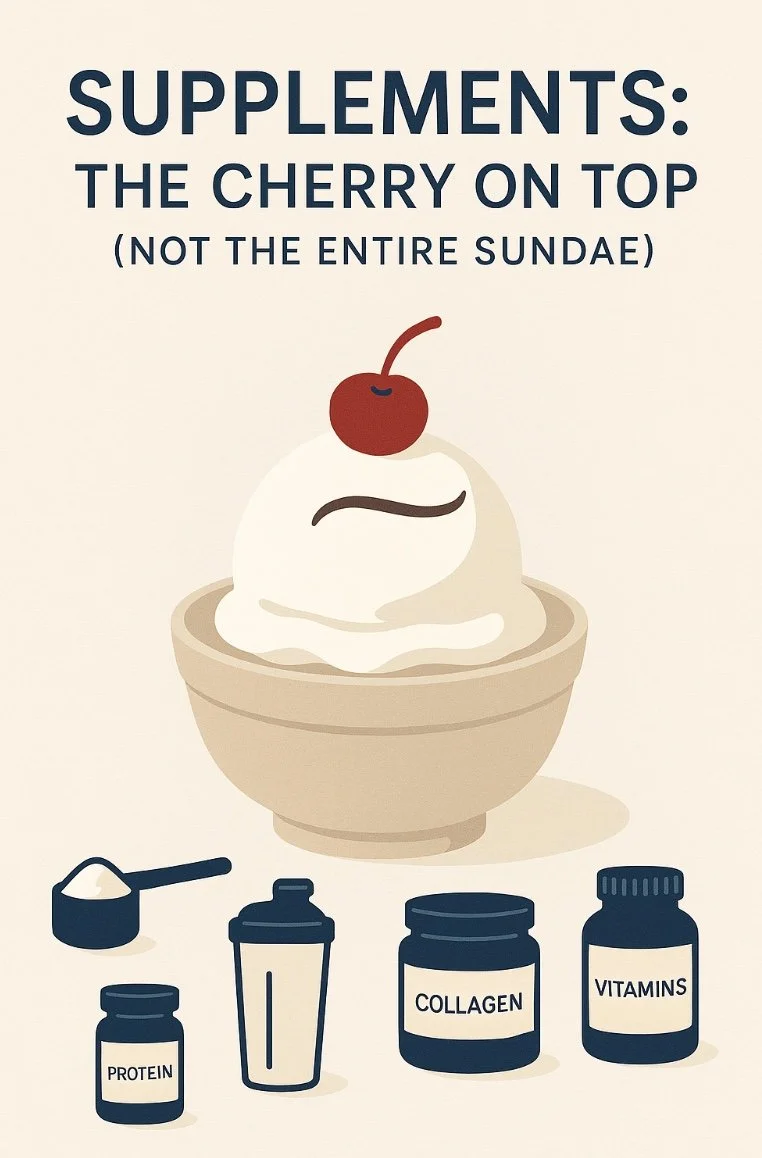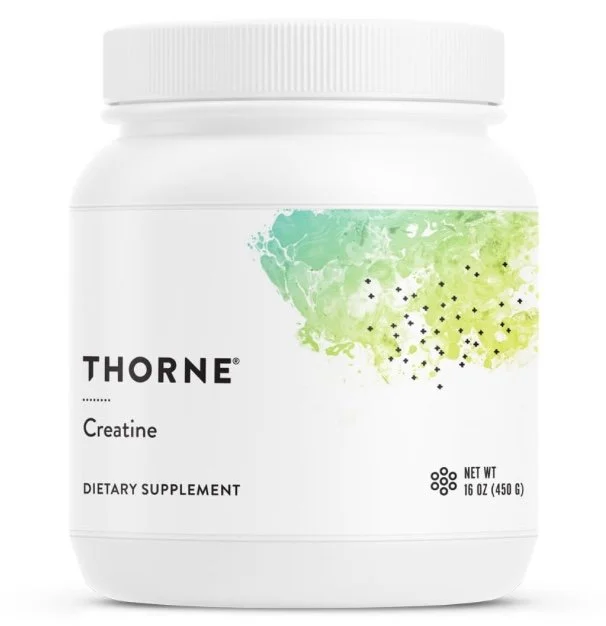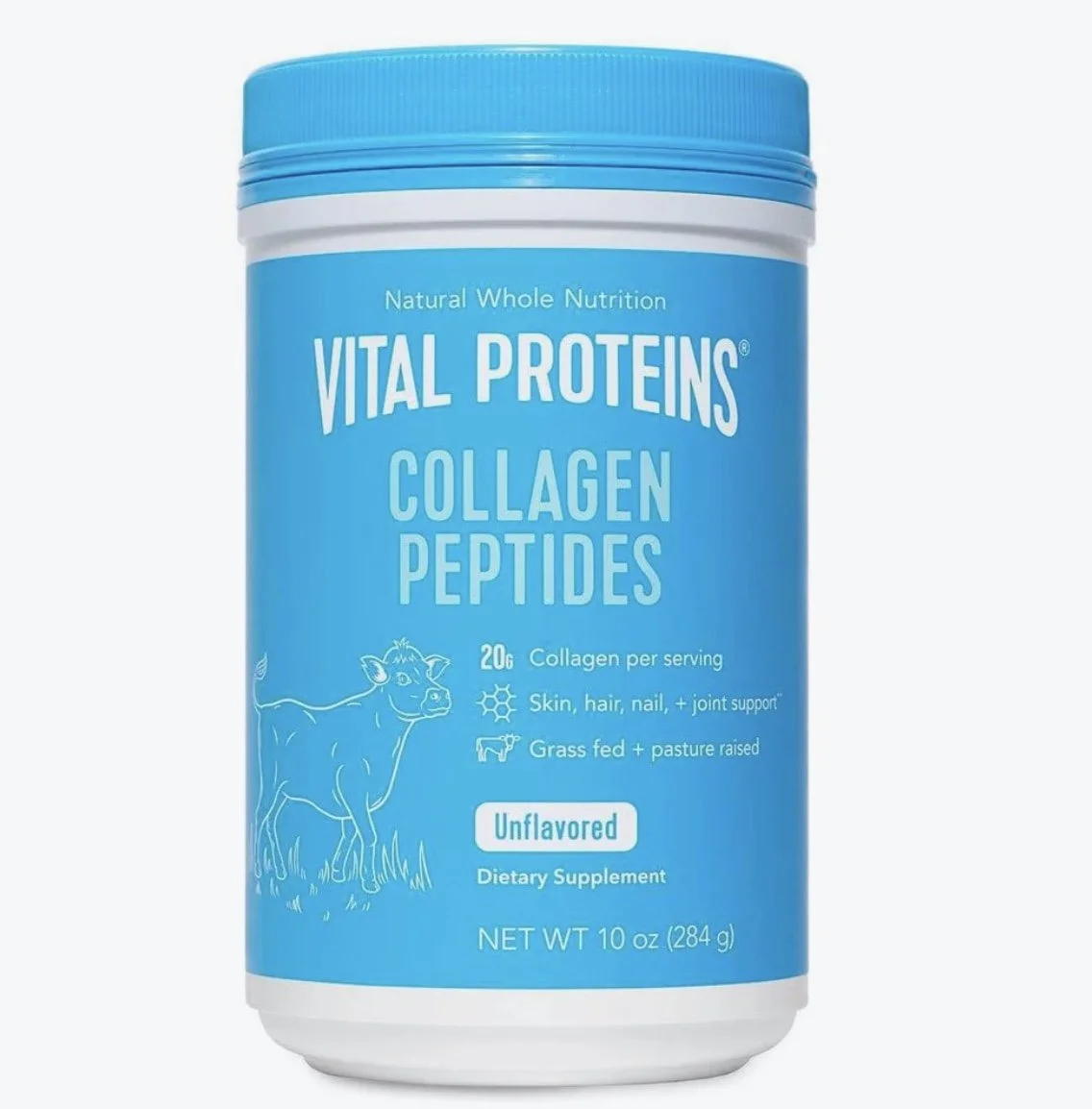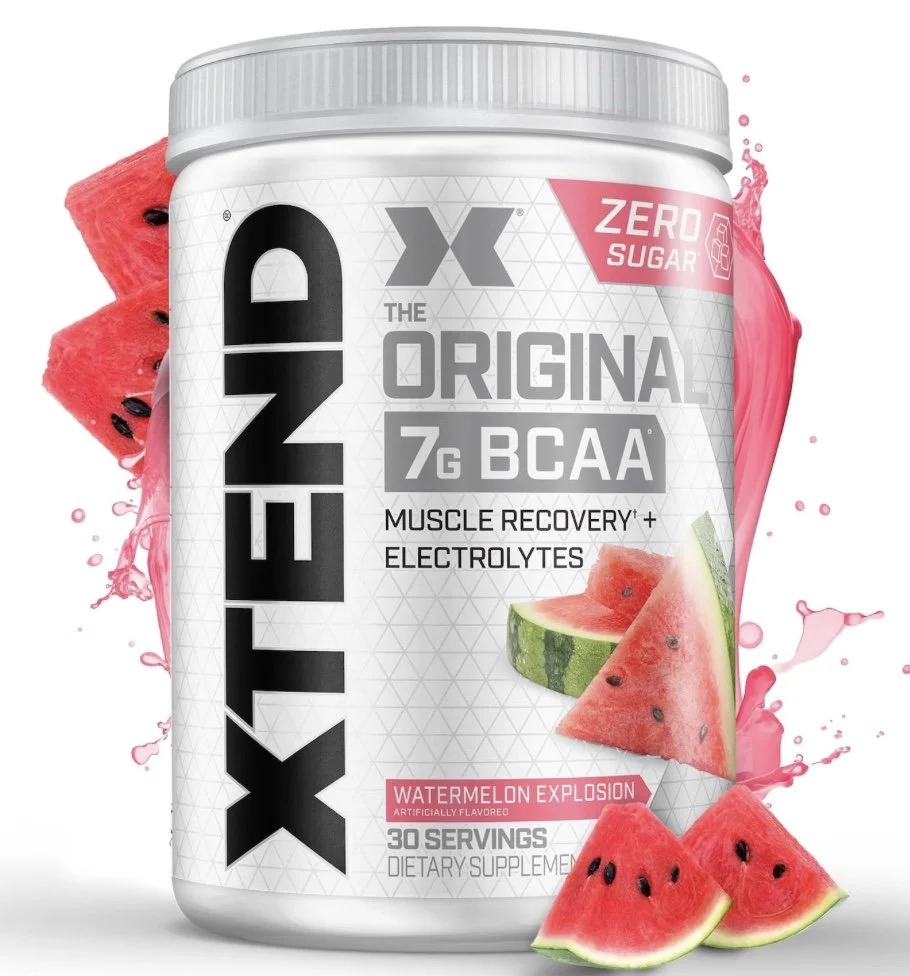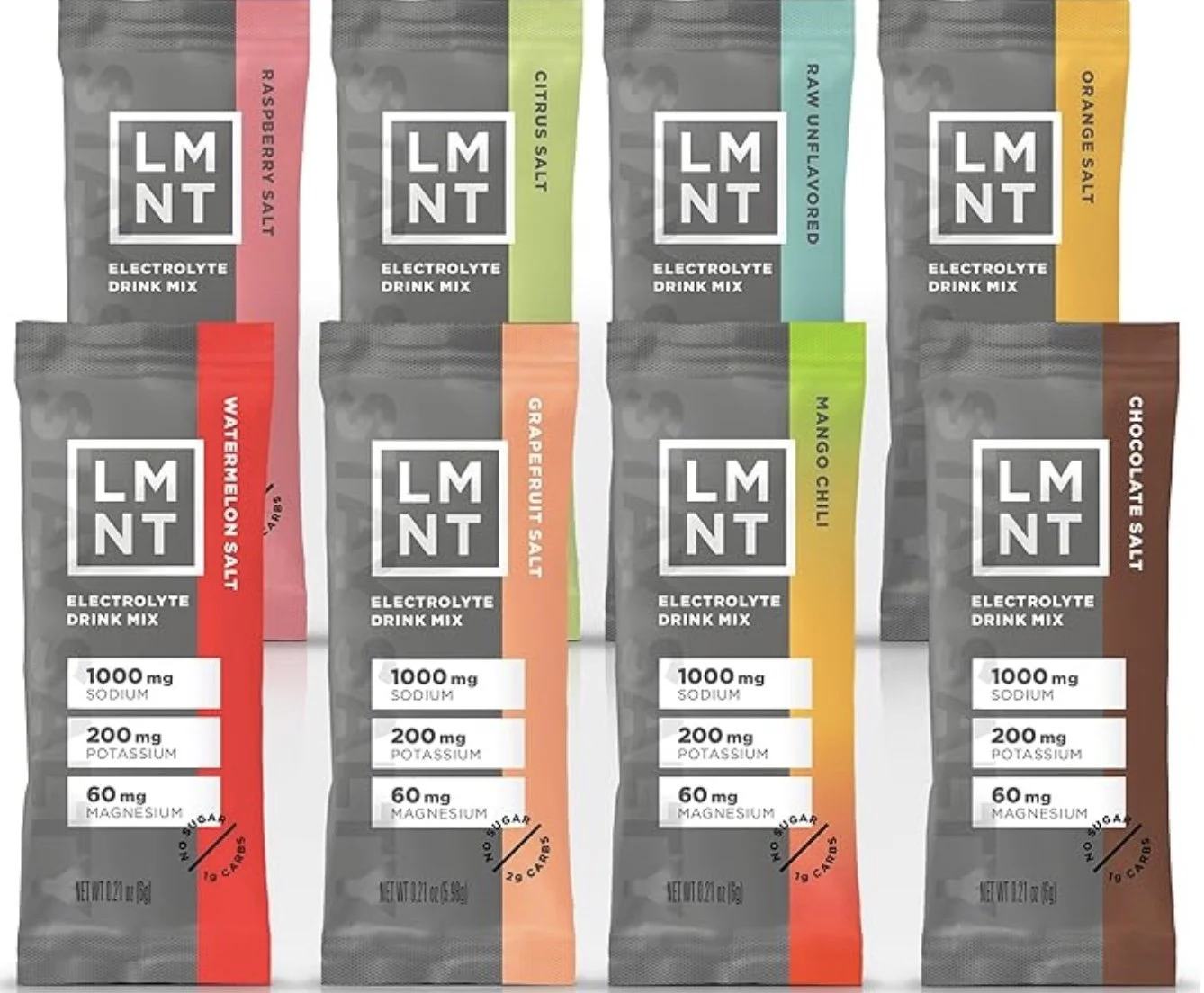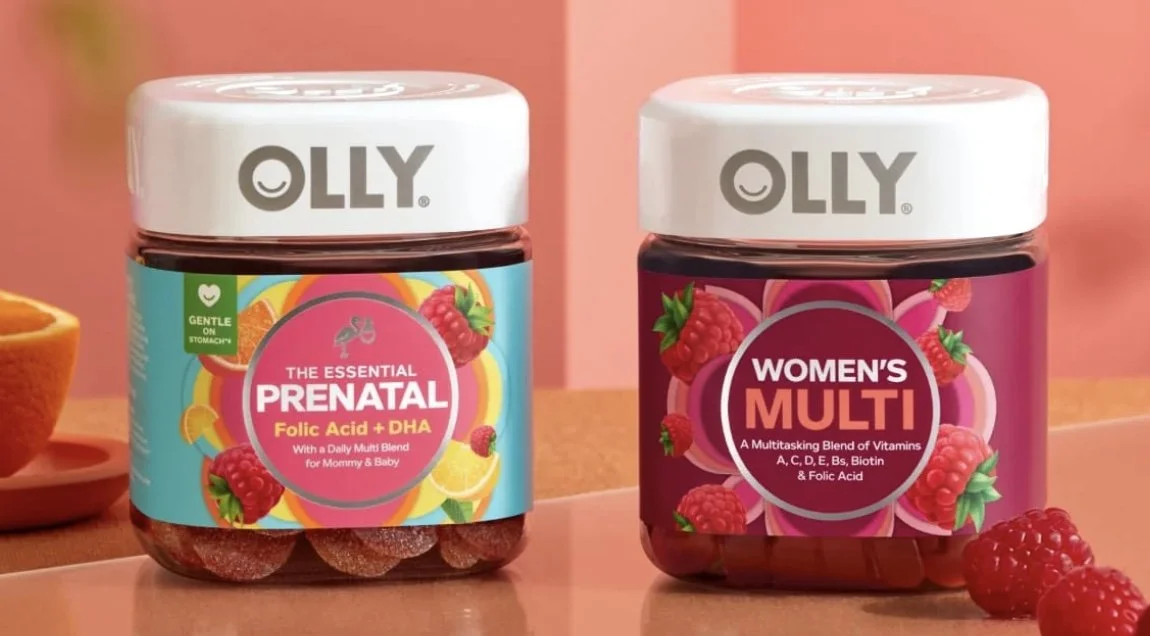Supplements: The Cherry on Top (not the entire sundae)
Let’s be clear: supplements are not the foundation of your health journey. They’re the cherry on top! If you’re strength training consistently, eating clean, and getting quality sleep, certain supplements can support you. But if you’re skipping workouts, surviving on energy bars, and running on 5 hours of sleep, no magic powder will fix that.
Here’s a simple breakdown of the ones I get asked about the most, starting with the one I recommend to just about everyone:
CREATINE
Let’s start with the MVP. Creatine is one of the most studied supplements out there. It supports strength, power, brain health, and even hydration. Everyone should be taking it (especially women). Dr. Stacy Sims, a leading researcher in female physiology, advocates for daily creatine supplementation to support cognitive function, muscle mass, and overall recovery (particularly in active women).
What is it?
Creatine is a compound that comes from three amino acids. Creatine is found mostly in your body's muscles as well as in the brain. Most people get creatine through seafood and red meat. It helps your muscles produce energy during high-intensity exercise.
Why people use it: To support muscle strength, endurance, recovery, and brain health.
How to take it: Take 5g daily. No need to load. No need to cycle. Just stay consistent.
What to look for: Go for creatine monohydrate. Look for brands that are third-party tested. Avoid flashy marketing and pink packaging - your muscles don’t care about branding.
PROTEIN POWDER
Food first, always. But supplementing with protein powder can help you hit your daily protein goals, especially post-workout or on busy days.
What is it?
A convenient source of protein derived from milk (whey), isolated milk proteins (isolate), or even slow-digesting forms like casein.
Why people use it: To hit protein targets for muscle repair, recovery, and satiety.
Types:
Whey: Cheapest, fast-digesting, may cause bloating if you’re dairy-sensitive.
Isolate: Cleaner, filtered, and my personal favorite because it’s easier on digestion.
Casein: Slow-digesting, best used before bed.
How to take it: Aim for 20–25g of protein per serving, which is typically 1 scoop. That’s about what your body can effectively use in one sitting.
Personal tip: I use a vanilla isolate from Dymatize. I don’t love it with water, but it’s great in smoothies with fruit or mixed into plain Greek yogurt for flavor.
CAFFEINE
What it is: A natural stimulant found in coffee, green tea, yerba mate, and various pre-workout supplements.
Why people use it: Caffeine has strong research supporting its role in boosting athletic performance, mental alertness, and endurance. It works by blocking adenosine (a compound that makes you feel sleepy), increasing dopamine and adrenaline.
Performance benefits:
Increased focus and reaction time
Reduced perception of effort
Improved endurance and power output
How much is helpful? Around 3–6 mg per kg of bodyweight is shown to support performance (e.g., 200–400 mg for most adults). More isn’t better and sensitivity varies.
Important to know:
Caffeine has a half-life of 5–6 hours, so consuming it late in the day can disrupt sleep.
Added ingredients in energy drinks, pre-workouts, and coffees (like sugar, artificial sweeteners, or stimulants) can have negative side effects.
You don’t need caffeine to train, but if you don’t currently consume it and want to try using it for performance, consider starting with a small amount (like a small black coffee) 30–60 minutes before training.
If to take it: Optional. A helpful tool—especially before morning workouts. But it’s not required and should be used with intention.
COLLAGEN
What is it?
Collagen is a protein that makes up the structure of your skin, tendons, ligaments, and joints. Our bodies naturally produce it, but that production declines with age.
Why people use it:
To support skin elasticity, joint health, and recovery. It’s popular among those looking to boost their skin or reduce joint discomfort.
A few things to know:
Collagen supplements may offer some benefits, but more research is needed to determine their effectiveness for various health conditions.
You can get collagen through food—especially from animal-based sources like bone broth, chicken skin, fish skin, and organ meats.
There’s currently no such thing as vegan collagen. Some products are labeled “vegan collagen boosters,” but they don’t contain actual collagen.
Is it part of my routine?
Honestly? It’s not part of my stack. I eat a variety of whole foods that provide the building blocks for collagen production, so I don’t feel the need to supplement it.
BCAAs
Branched-chain amino acids (leucine, isoleucine, and valine) are building blocks of protein. If you’re eating enough protein, you probably don’t need to supplement BCAAs—but they can be helpful in specific scenarios.
What is it?
A group of essential amino acids your body doesn’t produce on its own.
Why people use it: To support muscle recovery and reduce fatigue during long workouts or fasted training.
How I use it: I’ve gone back and forth. These days I keep a good BCAA blend on hand and use it during longer or double training sessions. Not a daily staple.
electolytes
These are critical for hydration, especially sodium and potassium. Most people think of coconut water as hydrating, but it’s mostly potassium-heavy with very little sodium.
What is it?
Minerals (like sodium, potassium, magnesium) that help regulate fluid balance, muscle contractions, and nerve function.
Why people use it: To stay hydrated and support performance in heat, long workouts, or if you’re a heavy sweater.
How to take it: Depends on the environment, intensity, and duration. For long, sweaty sessions or hot days, supplementing with an electrolyte mix can help. Look for one with a sodium-potassium balance.
MULTIVITAMINS
Let’s be real. Most gummies and store-bought multis are either under-dosed, poor quality, or filled with junk your body doesn’t absorb well.
What is it?
A blend of vitamins and minerals intended to “cover your bases.”
Why people use it: As a safety net—but often instead of improving their diet.
What I think: Gummy multis, prenatals, pretty pink pills—they all tend to have the same stuff, and not all of it in bioavailable forms. I don’t take one. I focus on a nutrient-dense, whole food diet instead.
SLEEPING AIDS
If you’re relying on a pill every night to sleep, we need to talk.
What is it?
Sleep aids range from over-the-counter pills to natural supplements like melatonin.
Why people use it: To fall asleep faster, stay asleep, or get better rest.
The truth: Regular use of sleep aids can mess with your circadian rhythm, and melatonin is a hormone—not a long-term solution.
What I recommend: Understand your circadian rhythm. Create a sleep-friendly environment. And on those nights where you really need help? Try tart cherry juice. Dr. Stacy Sims suggests it, and I’ve found it makes a difference. Plus, it’s a sweet treat before bed.
FINAL THOUGHTS
Supplements can support your progress—but they don’t replace the basics. Move your body daily. Eat real food. Prioritize quality sleep. That’s where the real magic happens.
If you want to start with just one supplement, make it creatine. It's simple, safe, and effective. Take it daily and start building the foundation you need.
Training consistently? Eating clean? Sleeping consistently? Talk to a Sports Performance Registered Dietician to dive deeper into what could be additional cherries on top for you.
— Sky

